George Clinton is widely regarded as one of the most important figures in the development of funk music, along with James Brown and Sly Stone. Clinton was the mastermind of the bands Parliament and Funkadelic, whose notable 1970’s albums include Mothership Connection, The Clones of Dr. Funkenstein, Maggot Brain, and One Nation Under a Groove, and whose songs include “Flash Light” and “One Nation Under A Groove” (both of which reached No. 1 in the US R&B charts), “Give Up The Funk (Tear the Roof Off the Sucker)”, “P-Funk (Wants to Get Funked Up)”, and “Dr. Funkenstein”. Clinton was inducted into the Rock and Roll Hall of Fame in 1997, and continues to tour.
This interview was done by phone on 6/9/16. (L. Paul Mann photo)
Jeff Moehlis: What can people look forward to on this tour?
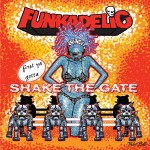
George Clinton: The new First Ya Gotta Shake the Gate album that I have out now, by Funkadelic – the performance of that along with the “Ain’t That Funkin’ Kinda Hard on You?”, which is the video that’s out. The first five songs on that album are going to be of special interest to a lot of people, because that’s the brand new part of the show that we’ve been doing all over the country. All the shows have been selling out. So that’s going to be of interest to a lot of people, that part of the show – it’s Funkadelic, but it’s fresh Funkadelic.
JM: There’s a lot of stuff going on onstage when you perform. How do you manage all the chaos, or is the point that you don’t manage it? You just let it happen?
GC: There’s a certain rhythm after a while. You get the rhythm of it. It’s like a play, but it’s a play that’s choreographed to the rhythm. So you learn to avoid people and not run into people. Sometimes you do when it’s really good, but even that’s like shouting in church. It’s just all part of the ritual.
JM: You’ve started using some backing tracks in concert, primarily for the new stuff. How is that being received?
GC: Oh, it’s working good, because of course being Funkadelic they’re going to do what Funkadelic does. They’re going to make funky use of that, you know, because even though we’re playing with it they’re still playing – you start getting solos and improvisations.
It’s just all part of the sound of today, that we have to catch up with. That’s the way most shows sound in hip hop. Even pop is mostly backing tracks, so people have gotten used to that sound. And it’s been there since hip hop started.
So we do our own show mixed in with all of that, so it’s just making a wider range of sounds. We do acknowledge that that is the sound of the day. But being old and cranky like we are, we’re going to crank up some live stuff the way we do it, just to make it all the more interesting. Because most of the stuff that most of the people know with that sound is samples of ours anyway. So it makes a lot of information travel to people and then they don’t know why they feel a certain way. “Wow, this shit sounds good!” We get all ages and nationalities and genders. Everybody is into it, and everybody’s cool with it.
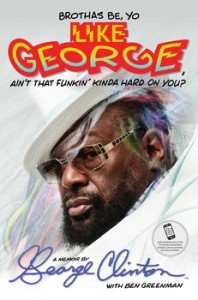
JM: Your memoirs came out recently. When you were working on your memoirs and reflecting on your life and music, were there any surprises that you learned about yourself?
GC: Well, I learned that not all my brain cells were burnt out [both laugh]. More stuff came back to me than I could even put in the book. We didn’t have enough room. But, yeah, I was surprised that I wasn’t really burnt out for real.
I was panicking when I finally quit using drugs, trying to make sure I had enough energy to write the memoir and to tell the story that I was fighting for the copyright shit. I had to make sure that I wasn’t a babbling idiot. Ain’t nobody gonna pay no attention to no shit like that. So I took my time doing that, and I didn’t want to be complaining if I couldn’t back it up. I knew what it would sound like, so I had to go real careful on the book.
The album… you’ve got so many songs on the album. The single from the album has the same title as the book – “Ain’t That Funkin’ Kinda Hard on You?”, the one with with Ice Cube and Kendrick Lamar. That song has the same title as the book. I tried to make it all relate to each other, so it would be one thought-out plan. So we did the video “Ain’t That Funkin’ Kinda Hard on You?” We’re doing another video now of the first four songs on the album, which is what I told you would be of special interest. We’re doing one long video of that, the way we do it onstage. That album will be interesting for the next couple of years.
Plus we’re doing a Parliament album which is called Medicaid Fraud Dog.
JM: Cool – I did want to ask if something’s in the works. How’s that coming along?
GC: It’s doing very well. Fred Wesley just left… I’m leaving Tallahassee now. Fred Wesley put the horns on about six or seven songs on the album. And we used the Florida State jazz band, the orchestra. So it’s going to be interesting to hear this funky stuff that’s coming out as Parliament, with the big band, the horns, and everything.
JM: When I look and listen to what you did with Parliament and Funkadelic in the 1970’s, it’s amazing how productive you were. How did you keep up that sort of pace, with multiple albums each year and the tours and everything?
GC: I had so much stuff recorded prior to getting started, because I’m always recording. And then once we got started, I had a team kind of like what Motown had, with all the different producers that Motown had. We were the junior version of that. I mean, I didn’t have to be in the studio with Junie Morrison when he did his part, I didn’t have to be there when Bootsy [Collins] laid his track down. I was there when Bernie [Worrell] would lay his part down. I would be there to start things up and certain people would do this or that part…
We had three rooms in the studio. We had it like an assembly line. It was the same people, just different people fronting it. The horn players were jumping from one studio to the other. The musicians we had – guitar players and bass players – we were jumping all around the place. It was a production line. We were planning on being Motown.
JM: Sounds like it was fun.
GC: Yeah, and it’s kind of like that now. I was just at the studio. I’ve got a bunch of kids – a lot of them are grandkids and there’s the kids in Tallahassee, Florida and around the country. They’re doing the same thing with the hip hop things that they do now, mixed with the musicianship of Parliament / Funkadelic. We learned to play with each other the same way we did in the ’60’s with the band playing over the top of doo-wop. Now we’re doing the same thing with hip hop and whatever you want to call it. It’s all funky to me when you mix it together.
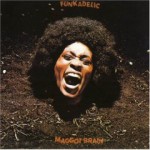
JM: I want to ask you about the Maggot Brain album, which I think is my favorite of all the ones you’ve done over the years. What are your reflections on that album, 45 years after it was released?
GC: Pretty much what I thought it would be at that time, doing a bluesy song like that. I was watching Jimi Hendrix, Cream, and all of them playing music that I had heard when I was a little boy. My mother was playing it – “Crossroads”… The stuff that Jimi played sounded like Lightnin’ Hopkins and Muddy Waters, you know what I heard when I was growing up. So knowing that that stuff was popular twenty years after it had been done before, I knew that “Maggot Brain”, “Free Your Mind and Your Ass Will Follow”, and those really crazy psychedelic songs we did would be valid twenty years from then. I knew they would be much more valuable years later.
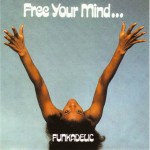
The Chili Peppers told me, when I met them, Free Your Mind [and Your Ass Will Follow] was their favorite album. That was in the ’80’s. We did the record in the ’60’s. So in 2016, it’s kind of like Jimi Hendrix and “Voodoo Child” and all of those kinds of songs. They’re like jazz stuff – they get better over the years, because he went so far out when he was doing them. For a commercial record, it takes years for people to agree, “Man, that was a pretty good piece of music.”
Bernie’s shit was classical, Eddie [Hazel] was the epitome of blues, even at 16 years old. And I was coming out of Motown, and already knew how to make a straight record. And we went the other way, intentionally. My partner was Jimmy Miller, who did The Rolling Stones, Spooky Tooth, and all those people. That was my partner in New Jersey in 1959. I saw what he did. I was aware of all of the stuff that the people at Motown were doing. That’s why we were able to change into the psychedelic thing, Psychedelic Shack and all that. We recognized Sly Stone, before he became a hit, we recognized as soon as we heard him that this was where we wanted to go. Anyway, we were going that direction. He beat us there, but we knew that was where we were going. We didn’t even try to be commercial at first. He at least did try to make accessible songs for the radio. We knew that “Free Your Mind” wasn’t going on the radio. Except for underground radio, which was FM at the time.
JM: You brought up Sly. Have you been in touch with him recently?
GC: Oh yeah, pretty much every other day or so.
JM: How’s he doing?
GC: He’s hanging in there. He’s beginning to get some of that money, but by no means is he getting what is owed him. But they’re beginning to give him the money now. We were raising so much hell and people were looking into it, so they got to do something.
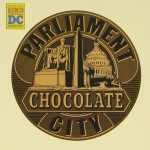
JM: About 40 years ago in the song “Chocolate City” you imagined Muhammad Ali at the President of the U.S. Of course he just passed away. What did Muhammad Ali represent to you over the years?
GC: He was the first person you heard around the world on TV saying what Malcolm [X] was saying basically to the black neighborhoods. He was the first one that could stand up there and say that, and say that “I’m the greatest”, as a black and all that. You couldn’t even say “black” when I was growing up. So when he came up, he made you proud even if he was just grieving.
He was that foundation that stood up and took his knocks when it came time when they took his title away from him, and stay all those years off the set. I don’t know nobody else that would’ve done that. He did that, and he came back and took his knocks and got his title back. He backed that shit up that he was talking. Nobody like that come along. When things happen like that, there’s no logical explanation. It was just meant to be. It was meant to be. You can’t change that no matter what you think. You can’t change that he was a good person. He didn’t go to fight in the war because he didn’t believe in the war. And we all agreed that the war was messed up after the fact. He is the greatest!
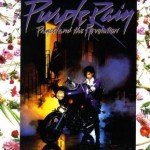
JM: Another person that we lost recently that I know was close to you is Prince. You did a really moving tribute to him in another interview. Now everyone’s talking about Prince’s vault. Do you have any idea what’s in there? Probably some of it includes stuff you did with him.
GC: Oh yeah, there’s a couple of things in there… We merged his band and us at our psychedelic-est. “Soul Psychedelicide” – it’s been on the internet a couple of times. That one was lots of fun. And there’s one I’m putting out that I did with him that we didn’t put out other than on the road, called “(Brother Can You) Paradigm”. That’s one of the slickest things, just him and myself. He’s playing some guitar – funky guitar, not rock ‘n’ roll, like Bootsy and Catfish [Collins] played.
JM: One other person that passed away recently was David Bowie.
GC: I was going to say, not only Prince but David Bowie. We’d done some things and shows together. There’s so many this year [that have passed away]. Those vibes are going to be missed – put it that way. I just try to remember the good times with all the ones that have passed.
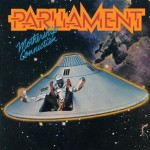
JM: Is it true that David Bowie helped to inspire “We Want the Funk”?
GC: Yeah, with the beat on the one that I was surprised to hear. [sings] “Faaaame, dit dit dit-dit, dit dit dit-dit. Faaaame…” We used the same thing. [sings] “Weeee got the funk dit dit dit-dit, Weeee want the funk…” You know, the same one, hard on the one. I told the drummer when we heard it, “Remember that beat” [laughs].
JM: Earlier today I interviewed Lee “Scratch” Perry. What are your thoughts on his contributions to the world of music?
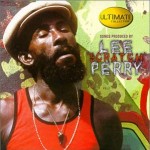
GC: It’s almost religion. You know I did some songs with him, right? But before that, starting way back from Bob Marley, Sly & Robbie and all of the people back then in Jamaican. The music that he made is religion for a lot of people of the world. Reggae and the things that he has done is probably the number one music that there is. He’s mostly responsible, from what I’m told, for all of that stuff back in the day. The dub music and everything. Modern hip hop don’t know that some of their roots come from that dub music in Jamaica.
JM: What advice would you give to an aspiring musician?
GC: Oh, man… Do the best you can and funk it. If you can remember to do the best you can and just funk it, have fun after that. Don’t let the what somebody else is doing get you jealous – you get old from being jealous. If you don’t have none of that you don’t ever get old. You can learn to like whatever the new music is, coming behind you. You can like that right from the very beginning, have fun with your musicians and friends, and don’t change it. That’s your best hope in doing this and keep playing and keep liking it. Make sure you like the music, first of all. You have to like it enough for somebody else doing something new to put you out of business. Once you can do that, you don’t get put out of business as quick because usually you give up when you think you ain’t what’s happening. So just do the best you can and funk it!
JM: You mentioned the influence of Motown, and I know you were in Detroit at a really exciting time. There are other people around back then that are still in the music business, like Iggy Pop and Ted Nugent. Did you know those guys back then, and have you been surprised at how their careers have unfolded?
GC: They used to call us the “Bad Boys of Ann Arbor”. Ted Nugent was the Amboy Dukes – that was the name of his band back then. “Journey to the Center of your Mind”. We had “(I Wanna) Testify”. Iggy was Iggy Pop and the Stooges. There was John Sinclair. We all had the same agent, Diversified Management. All of that rock thing in 1966 and ’67, we all were a part of it. You know, even Stevie Wonder used to be part of it, because his stuff was just coming out and he hung out in the Ann Arbor area, too. He had to get John Sinclair out of jail for two joints. They wanted to give him life for two joints. Then when John [Lennon] and Yoko [Ono] came over – we was all a part of that.
JM: Do you stay in touch with any of those guys still?
GC: I run into Iggy – he’s in Florida somewhere, too. The other one was Alice Cooper. He’s coming here pretty soon. I stay in touch with him. His manager, Shep Gordon, was our manager, too. I was with Shep in Maui the year before last. We stay in touch, pretty much all of the ones who are still in the business.
JM: This is 40 or 50 years after you all started. Back then, did any of you think you’d still be in the music business now?
GC: Oh, I did. Oh, hell yeah! Because I can’t imagine doing nothing else.

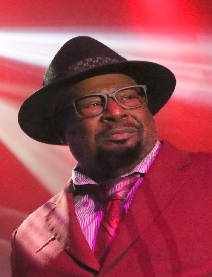
Discussion
No comments for “Interview: George Clinton”